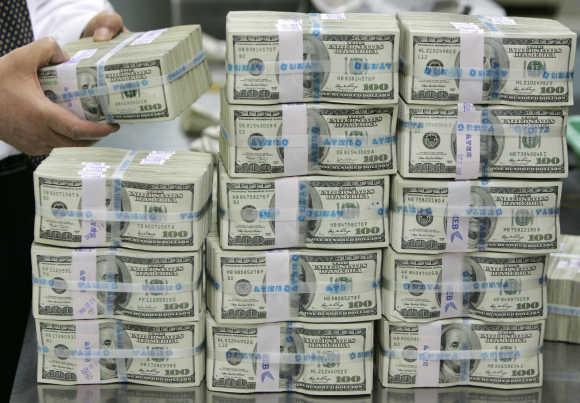 Echoing the position articulated by Prime Minister Manmohan Singh, China and Russia on Thursday warned that imminent withdrawal of fiscal stimulus by the US could have an adverse impact on the global economy and cautioned the Obama administration against it.
Echoing the position articulated by Prime Minister Manmohan Singh, China and Russia on Thursday warned that imminent withdrawal of fiscal stimulus by the US could have an adverse impact on the global economy and cautioned the Obama administration against it.
Ahead of the summit of the Group of 20 industrialised and major emerging economies, Prime Minister Singh had emphasised the need for an "orderly exit" from unconventional monetary policies being pursued by the developed world to avoid "damaging" growth prospects of the developing world.
With the five countries in the BRICS bloc hard hit by slow economic growth, host Russia and China, articulated their concerns about the planned 'tapering' of the US Federal Reserve multi-billion dollar monetary stimulus policy.
As both economic issues, especially the slowdown in the BRICS bloc and Syria are set to top the agenda, the host country and China highlighted the fallout of the imminent phasing out of the fiscal stimulus package which had helped the emerging economies by providing liquidity at the height of the 2008 financial crisis.
Zhu Guangyao, China's deputy finance minister, asked the US to be "mindful" of the spillover effects and work to contribute to the stability of the global financial markets and the steady recovery of the global economy.
However, he appeared to rule out the possibility of a bailout for any country in any financial difficulty. BRICS comprises of Brazil, Russia, India, China and South Africa. After the value of rupee fell by 20 per cent to a dollar this year, India had mooted joint forex intervention by the major emerging economies.
India, has not approached the other BRICS countries despite issuing a public appeal last week for joint forex intervention after the rupee rout, Russia's summit coordinator Ksenia Yudayeva said.
"We didn't agree on specific measures yet," Yudayeva told a separate briefing, adding that the picture would be clearer when G20 finance ministers meet again in October.
"The countries that have faced the biggest recent capital outflows also have quite weak fundamentals," she said, suggesting that both domestic and international factors were at play in the most troubled economies.
The possibility of winding down the Federal Reserve's $85 billion per month bond-buying programme has triggered massive capital outflows beside leading to depreciation in the currencies in the BRICS bloc.
The US Federal Reserve is widely expected this month to take its first steps to reduce the extraordinary monetary stimulus, with potentially huge implications for a global financial system that has come to depend on a cheap and abundant supply of dollars Arvind Mayaram, economic affairs secretary, said India expected a very strong statement on the G20 having a consensus on the concern about the spillover effects.
"I think if a strong statement is made on these two points, it will have a major calming impact on the markets in the emerging economies," he told reporters ahead of the summit.
On the sidelines of the St Petersburg summit, the BRICS leaders are expected to work for a consensus on creating a $100 billion currency reserve fund to help ease short-term liquidity pressure and safeguard financial stability of major emerging economies.
The BRICS bloc is also reported to have agreed on the capital structure for a proposed development bank that aims to reduce their reliance on Western financial institutions. The bank is likely to have $50 billion as initial capital.







 © 2025
© 2025